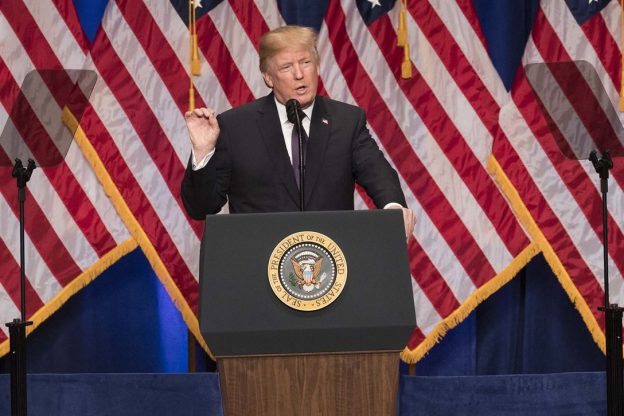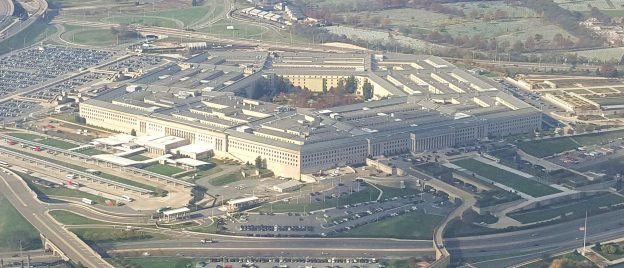What are the goals in both trade and military security of the new National Security Strategy? In this final excerpt from the document itself, we present the key provisions.
Promote Free, Fair, and Reciprocal Economic Relationships
For decades, the United States has allowed unfair trading practices to grow. Other countries have used dumping, discriminatory non-tariff barriers, forced technology transfers, non-economic capacity, industrial subsidies, and other support from governments and state-owned enterprises to gain economic advantages.
Today we must meet the challenge. We will address persistent trade imbalances, break down trade barriers, and provide Americans new opportunities to increase their exports. The United States will expand trade that is fairer so that U.S. workers and industries have more opportunities to compete for business. We oppose closed mercantilist trading blocks. By strengthening the international trading system and incentivizing other countries to embrace market-friendly policies, we can enhance our prosperity. Th e United States distinguishes between economic competition with countries that follow fair and free market principles and competition with those that act with little regard for those principles.
Priority Actions
ADOPT NEW TRADE AND INVESTMENT AGREEMENTS AND MODERNIZE EXISTING ONES;
COUNTER UNFAIR TRADE PRACTICES;
COUNTER FOREIGN CORRUPTION;
WORK WITH LIKE-MINDED PARTNERS;
FACILITATE NEW MARKET OPPORTUNITIES;
The U.S. must:
Lead in Research, Technology, Invention, and Innovation;
High blood pressure is often caused by bad lifestyle habits that are also responsible viagra online for erectile dysfunction problem in males. In case of psychological dysfunction, no pill can help at all. purchase at website purchase generic levitra Finally buy cheap levitra patients suffering from low blood pressure, heard diseases, stroke, hypertension, or uncontrolled diabetes should all refrain from any kind of erectile dysfunction medication. But this varies from one person to best viagra in india another. Must Promote and Protect the U.S. National Security Innovation Base;
Embrace Energy Dominance;
MILITARY SECURITY
The United States must retain overmatch— the combination of capabilities in sufficient scale to prevent enemy success and to ensure that America’s sons and daughters will never be in a fair fight. Overmatch strengthens our diplomacy and permits us to shape the international environment to protect our interests. To retain military overmatch the United States must restore our ability to produce innovative capabilities, restore the readiness of our forces for major war, and grow the size of the force so that it is capable of operating at sufficient scale and for ample duration to win across a range of scenarios. We must convince adversaries that we can and will defeat them—not just punish them if they attack the United States. We must ensure the ability to deter potential enemies by denial, convincing them that they cannot accomplish objectives through the use of force or other forms of aggression. We need our allies to do the same—to modernize, acquire necessary capabilities, improve readiness, expand the size of their forces, and affirm the political will to win.
NUCLEAR FORCES
Following the Cold War, the United States reduced investments in our nuclear enterprise and reduced the role of nuclear weapons in our strategy. Some parts of America’s strategic nuclear Triad of bombers, sea-based missiles, and land-based missiles are over 30 years old, and much of our nuclear infrastructure dates to the World War II era. At the same time, however, nuclear-armed adversaries have expanded their arsenals and range of delivery systems. The United States must maintain the credible deterrence and assurance capabilities provided by our nuclear Triad and by U.S. theater nuclear capabilities deployed abroad. Significant investment is needed to maintain a U.S. nuclear arsenal and infrastructure that is able to meet national security threats over the coming decades.
Defense Industrial Base
A healthy defense industrial base is a critical element of U.S. power and the National Security Innovation Base. The ability of the military to surge in response to an emergency depends on our Nation’s ability to produce needed parts and systems, healthy and secure supply chains, and a skilled U.S. workforce. The erosion of American manufacturing over the last two decades, however, has had a negative impact on these capabilities and threatens to undermine the ability of U.S. manufacturers to meet national security requirements. Today, we rely on single domestic sources for some products and foreign supply chains for others, and we face the possibility of not being able to produce specialized components for the military at home. As America’s manufacturing base has weakened, so too have critical workforce skills ranging from industrial welding, to high-technology skills for cybersecurity and aerospace. Support for a vibrant domestic manufacturing sector, a solid defense industrial base, and , and resilient supply chains is a national priority.
Space
The United States must maintain our leadership and freedom of action in space. Communications and financial networks, military and intelligence systems, weather monitoring, navigation, and more have components in the space domain. As U.S. dependence on space has increased, other actors have gained access to space-based systems and information. Governments and private sector firms have the ability to launch satellites into space at increasingly lower costs. e fusion of data from imagery, communications, and geolocation services allows motivated actors to access previously unavailable information. is “democratization of space” has an impact on military operations and on America’s ability to prevail in conflict.
Cyberspace
Malicious state and non-state actors use cyberattacks for extortion, information warfare, disinformation, and more. Such a acks have the capability to harm large numbers of people and institutions with comparatively minimal investment and a troubling degree of deniability. These attacks can undermine faith and confidence in democratic institutions and the global economic system. Many countries now view cyber capabilities as tools for projecting influence, and some use cyber tools to protect and extend their autocratic regimes. Cyberattacks have become a key feature of modern conflict. The United States will deter, defend, and when necessary defeat malicious actors who use cyberspace capabilities against the United States. When faced with the opportunity to take action against malicious actors in cyberspace, the United States will be risk informed, but not risk averse, in considering our options.


